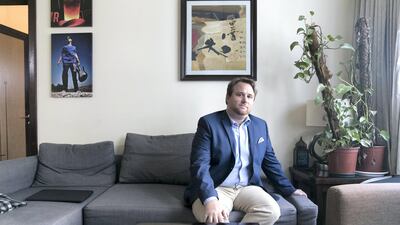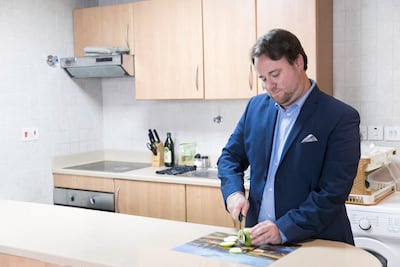When Zach Holz set out to eat all of his meals at home for a month, he was fairly sure he was going to reconfirm the findings of one of his favourite bloggers on the subject of financial independence.
Like the Canadian Mr Money Moustache, who blogs about early retirement and managing his finances frugally, he was expecting nothing short of a money-saving epiphany.
“I totally didn’t feel that way at all,” says Mr Holz, a 35-year-old American teacher living in Dubai. “I felt trapped. I felt like I wasn’t able to hang out with people I enjoyed hanging out with, because they were going out for dinner. And I didn’t save that much money either, so it kind of failed all around.”
Knowing himself better and providing other people with insight they can apply to their own lives was the main reason Mr Holz started his blog The Happiest Teacher in January. His three areas of focus are all about his passions: international teaching – he teaches English at Dubai's Universal American School – photography, percussion, cooking, travel and financial independence.
“I am obsessed with personal finance,” he explains in his bio, “and making sure I have enough money to not be forced to stay in a bad situation just because I need the pay cheque.”
Mr Holz is meticulous in the way he documents his progress, with graphs and pie charts, lots of detail and hard figures. He is also not shy about telling you exactly where he’s at, right down to the dollar. For the third quarter of this year, he says his net worth is about US$113,000 (Dh415,000), up about $10,500, or 9 per cent. Of that he has saved $4,500; the rest is thanks to the performance of his index fund-based investment portfolio, which rose to the tune of 6.67 per cent. “That's largely due to the outsized performance of my ‘fun money’ ETF, ARJW, which was up about 17 per cent,” he says.
When it came to his test on saving money on eating out, Mr Holz points out that cooking most meals at home would probably be a money saver for a family, but it’s not that effective for someone living on their own. And the self-professed “obsessive learner” did walk away from the month-long experiment in May with something he loves: data, plenty of it, about what he likes and needs in the area of food and socialising. While he missed his friends and also the meals – he only ate out five times in May, compared to June when he spent 27 per cent of his earnings on restaurants – there were also other factors at play.
“I realised that I didn’t like being without choices,” he says, “and I really didn’t like washing the dishes.”
Mr Holz has long possessed common sense when it comes to money. His family moved around a lot when he was young, as his father was in the US Navy, and he noticed early on that there was a big difference between the way his parents approached the topic of their finances.
“My mum was always much more disciplined and didn’t really buy into the ‘keeping up with the Joneses aspect of things, and the pressure,” he says. “It never really seemed to resonate with her and I think I picked up some of those good habits. Whereas my dad lights up the room for salesmen whenever he walks into one. He’s a salesman’s dream.”
Mr Holz has vivid memories of his mother intervening whenever he wanted something “new and shiny”, such as a pair of expensive trainers, when he was in middle school.
“She sat me down and said ‘do you really want this, do you need it?’,” he says. “‘Or are you doing it because everyone else does it?’”
Mr Holz was able to see that his father’s approach led to issues, and his mother’s was more sustainable. And so he became financially responsible, saving regularly and expansively since he started working. During four years in Bahrain he cleared $26,000 in student loans and saved $20,000. He has also steered clear of credit cards.
“I saw people around me getting in trouble and it scared me,” he says. “For me, I just don’t want the interest rates and the temptation to screw up.”
But despite all that he was, like many expatriates, completely lost when it came to investing.
“I tried to invest on my own and as we know, that’s a terrible idea,” says Mr Holz, who has never had a financial adviser. “I’d read enough to be dangerous and nothing was happening and I was losing money and I was adjusting all the time.”
Then, in 2016, Andrew Hallam was brought in to speak at Dubai American Academy, where Mr Holz was teaching. Listening to the Canadian international teacher-turned-millionaire, who has written about his approach to spurning financial advisers in favour of self-management of index funds in several books, changed everything.
“The light bulb went off,” says Mr Holz. “It was a total revelation.”
_________
Read more:
10 blogs to help you achieve financial independence
How to achieve financial independence
Finance guru Andrew Hallam’s new guide for expats wanting to become wealthy
Dubai resident: 'I retired at 37 after achieving financial independence in two years'
________
Mr Holz had taken all of his money out of the markets when US President Donald Trump was elected, figuring they were going to crash.
He realised that by following Mr Hallam’s system of investing in stock and bond indexes over simply saving, “I could give myself a raise”. Over the course of the next year Mr Holz started funnelling what he had, which at the time was almost $60,000, in $10,000 increments.
Keeping his investments at an 80/20 per cent split between stocks and bonds, he is closing in on doubling his net worth in two years. He is not shy of writing about mistakes, either, including one post where he chose the Fundamental Index Fund over the Vanguard World Stock Index (VT).
Mr Holz ended up choosing Vanguard's American Stock Index (VTI) for its “tiny” 0.04 per cent expense ratio, which is less than half of VT’s.
He has also become interested in property, figuring that building a portfolio now might help with his goal of retiring with a net worth of $1 million by the age of 50. He is interested in a turnkey situation, the kind offered through websites such as Roofstock.com, which list affordable properties along with easier access to everything from mortgages to property managers.
Mr Holz is considering putting his next $20,000 saved as a down payment on a rental property, and, depending how the first one goes, doing that twice more over the next three years.
“This way, at the end of three years, I will have three rental properties and my stocks/bonds,” he wrote on his blog. “At that point I can either just start ploughing money back into my stocks/bonds or decide if I want more rentals.”
But a happy life is not all about saving and investing. Mr Holz believes humans were born to create – and not surprisingly, he has been successful at turning that urge into several lucrative side hustles.
When he taught in Bahrain several years ago, he took an interest in photography and learned everything he could about it. Soon he and a friend were giving photography workshops, earning 20 to 30 per cent of their monthly salaries on the side.
He has also been a drummer since the age of 10 and is part of a band called The Part-Time Sinners, which plays regular gigs around Dubai. Although his income from music varies month to month, it can be up to 20 to 30 per cent of his salary, depending on how many gigs the band performs.
Mr Holz does not know what he will do when he retires at his target age of 50. He loves teaching and has visions of becoming a financial coach, something he has already started doing at his school.
It wasn’t just his mother’s advice that influenced him. Moving around – outside the US Mr Holz has lived in China and Thailand, in addition to Bahrain and the past four years in the UAE – also taught him a valuable lesson about the pitfalls of consumerism.
“I know that more stuff isn’t going to do it, it’s just going to clutter up my life and my apartment, and I’m just going to feel bad about creating more packaging, and then I’m probably going to move at some point,” he says. “And I’ve realised that one of my favourite days is, before you move and you give away all your stuff, and I love that."
__________
Read more:
Dubai blogger behind 'I Retired Young' on how he achieved financial independence
The best blogs to help millennials manage their money
Personal finance in the UAE: Residents track finances better but struggle with saving and debt
__________
Zach's savings strategy
Zach Holz’s most-read blog post is called: How do you save money?
Essentially he creates a savings goal, figures out how many months it will take, calculates his expenses, then works from there how much he can spend.
Although his income varies from his musical gigs, Mr Holz’s base salary last year was Dh14,292 plus housing allowance, flights and health insurance. After setting a goal of saving $20,000 per year, with three months off saving to pay for travel, he decided to save Dh8,154 per month over nine months.
Allowing for his bigger expenses – rent, car – Mr Holz keeps his monthly discretionary spending on things like groceries, going out to eat and entertainment at Dh6,000. He broke that down to Dh150 per day on weekdays and Dh270 per day on weekends, balancing out the days he spends more with the ones he spends less.
The key to saving like this, he explains, is recognising that unlike achieving financial independence, consumerist "wants" only provide short-lived satisfaction.
“You get the initial burst of serotonin, but then the thing ages and you lose that,” he says. “Then you do that again and again and again.”
Mr Holz tracks his expenses daily, as well as weekly and monthly, and challenges himself to save even more when possible.
“I’m a teacher and I’ve studied psychology whenever I’ve had the chance, and happiness is a part of that,” he says. “It seemed pretty obvious from early on that I actually got more of a rush out of saving money than I did spending it.”


